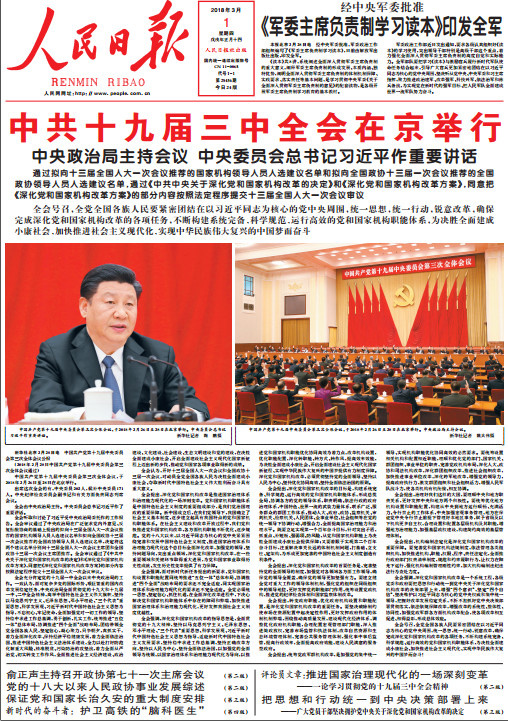By Huan Xiang from People’s Daily

The convening of the third plenary session of the 19th CPC Central Committee makes headline of People’s Daily on March 1, 2018.
The 19th Communist Party of China (CPC) Central Committee issued a communique at the end of its three-day third plenary session, which concluded on Wednesday. According to the communique, the plenary session reviewed and adopted a decision by the CPC Central Committee on deepening reform of Party and state institutions as well as guidelines for the reform.
Deeper reform on Party and state institutions is a profound evolution in modernizing China's system and capacity for governance, the communique said.
The 19th CPC National Congress proposed to move on to all-out efforts to build a great modern socialist country, and made clear that the overall goal of deepening reform in every field is to improve and develop the system of socialism with Chinese characteristics and modernize China’s system and capacity for governance.
The third plenary session of the 19th CPC Central Committee, convened four months after the conclusion of the 19th CPC National Congress, has drawn special attention. Previously, the third plenary sessions, aimed at studying reform agenda, were usually convened in the second half of the year over the past four decades.
The plenary session made clear that the goal of deepening reform of Party and state institutions is to establish a Party and state institutional function system that is well conceived, fully built, procedure based, and efficiently functioning.
Deeper reform will form a CPC leadership system that ensures the Party always provides overall leadership and coordinates the efforts of all involved, a law-based administrative governance system with clear functions and responsibilities, a world-class armed forces system with Chinese characteristics, as well as a sound work system of people's organizations for bridging and serving the general populace.
The reform will also promote coordinated actions and resultant forces among the people’s congresses, governments, political advisory bodies, and supervisory, judicial and prosecutorial organs, people's organizations, enterprises, public institutions, and social organizations under the unified leadership of the CPC.
Deeper reform on the CPC and state institutions will improve China's governance level and capacity, the communique added.
A primary task of deepening reform of the Party and state institutions is to improve the system for upholding overall Party leadership in a bid to strengthen the CPC's leadership in every sector, ensure its all-encompassing coverage and make it more forceful, according to the communique.
The institutional reform is a self-revolution, a profound change on national governance, a necessary requirement to strengthen the Party’s long-term governance capacity, and a prerequisite to build a modern socialist country and realize national rejuvenation, People’s Daily said in a commentary published on Thursday.
The newspaper admitted some existing challenges encountered by the Party and state institutions, such as defects in the structure and allocation of functions in some Party institutions, as well as unscientific duty division, unfulfilled duties and low efficiency of some state organs.
Besides, checks and oversight over the exercise of power in some fields need further optimization, and issues including abuse of power and influence peddling still exist, the paper added.
Deeper reform on Party and state institutions is a profound evolution in modernizing China's system and capacity for governance, the communique said.
The 19th CPC National Congress proposed to move on to all-out efforts to build a great modern socialist country, and made clear that the overall goal of deepening reform in every field is to improve and develop the system of socialism with Chinese characteristics and modernize China’s system and capacity for governance.
The third plenary session of the 19th CPC Central Committee, convened four months after the conclusion of the 19th CPC National Congress, has drawn special attention. Previously, the third plenary sessions, aimed at studying reform agenda, were usually convened in the second half of the year over the past four decades.
The plenary session made clear that the goal of deepening reform of Party and state institutions is to establish a Party and state institutional function system that is well conceived, fully built, procedure based, and efficiently functioning.
Deeper reform will form a CPC leadership system that ensures the Party always provides overall leadership and coordinates the efforts of all involved, a law-based administrative governance system with clear functions and responsibilities, a world-class armed forces system with Chinese characteristics, as well as a sound work system of people's organizations for bridging and serving the general populace.
The reform will also promote coordinated actions and resultant forces among the people’s congresses, governments, political advisory bodies, and supervisory, judicial and prosecutorial organs, people's organizations, enterprises, public institutions, and social organizations under the unified leadership of the CPC.
Deeper reform on the CPC and state institutions will improve China's governance level and capacity, the communique added.
A primary task of deepening reform of the Party and state institutions is to improve the system for upholding overall Party leadership in a bid to strengthen the CPC's leadership in every sector, ensure its all-encompassing coverage and make it more forceful, according to the communique.
The institutional reform is a self-revolution, a profound change on national governance, a necessary requirement to strengthen the Party’s long-term governance capacity, and a prerequisite to build a modern socialist country and realize national rejuvenation, People’s Daily said in a commentary published on Thursday.
The newspaper admitted some existing challenges encountered by the Party and state institutions, such as defects in the structure and allocation of functions in some Party institutions, as well as unscientific duty division, unfulfilled duties and low efficiency of some state organs.
Besides, checks and oversight over the exercise of power in some fields need further optimization, and issues including abuse of power and influence peddling still exist, the paper added.
 Menu
Menu
 China on the way to deeper reforms of Party and state institutions
China on the way to deeper reforms of Party and state institutions
















